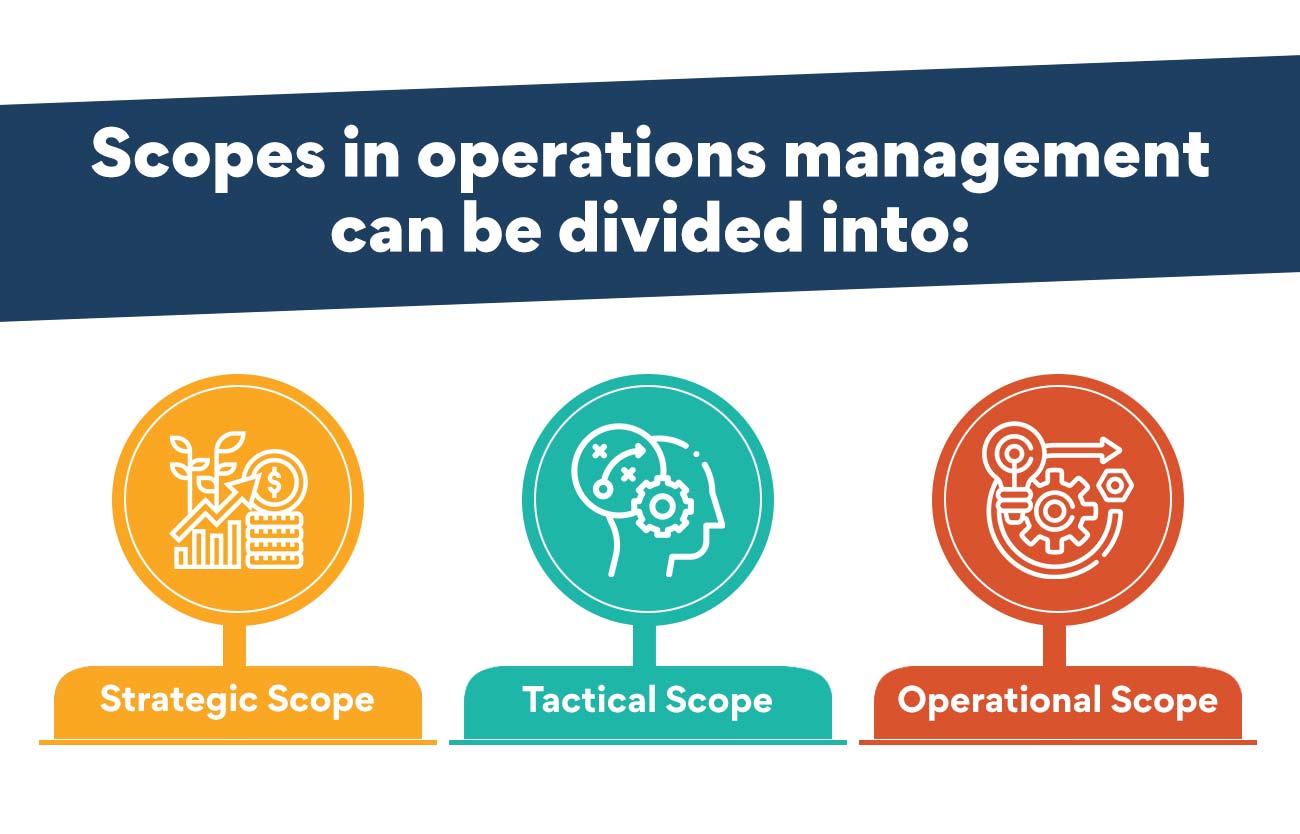Operations management is a vast and complex field encompassing many aspects of a business. From planning and organizing to staffing and controlling, operations managers are responsible for ensuring that everything runs smoothly within their organization. But what exactly is the scope of operations management?
In this blog post, we will explore the various responsibilities that fall under the umbrella of operations management and discuss how it impacts businesses of all sizes.
Understanding Scope of Operations Management
Operations managers ensure that an organization’s operations run smoothly and efficiently. It is a field of business involving the management and production of goods and services. It includes overseeing facility design, planning, construction, maintenance, and control.
The scope of operations management can be quite broad, as it covers all aspects of an organisation’s operations. For example, operations managers may be responsible for managing the supply chain, designing and supervising manufacturing processes, overseeing quality control, or managing customer service.
No doubt, operations management is a critical function in any organisation, as it is vital in ensuring that its operations are efficient and effective. In today’s competitive business environment, organisations must be able to operate efficiently and effectively to survive and thrive. Thus, operations managers play a pivotal role in ensuring that an organisation’s operations are up to par.
There is a wide range of techniques and tools that operations managers use to improve an organisation’s operations. These tools and techniques include process improvement, quality control, Six Sigma, and lean manufacturing. Using these tools and techniques, operations managers can help organisations save time, money, and resources while improving quality and productivity.
Operations management (OM) is indeed a challenging and complex vertical, but it is also significant. Organisations cannot survive and thrive without effective operations management. Thus, those who enter this field can expect to find plenty of opportunities for career growth and advancement.
If you want to learn about operations management, check out our certificate course: Advanced Certificate in Ops, SCM, and PM.
Types of Scope in Operations Management
OM is critical to business growth concerned with the production of goods and services and involves the management of resources, processes, and people.
Scopes in operations management can be divided into three broad categories:
- Strategic Scope: This type of scope deals with long-term goals and objectives. It includes decisions about what products or services to offer, what markets to operate in, and how to allocate resources.
- Tactical Scope: This type of scope deals with short-term decisions that are necessary to achieve the organization’s strategic objectives. It includes decisions about production plans, schedules, and inventory levels.
- Operational Scope: This type of scope deals with the day-to-day decisions that are necessary to keep the organization’s operations running smoothly. It includes decisions about resources, processes, and people.
The scope of operations management is constantly evolving as the field adapts to changes in technology, markets, and customer demands. As a result, operations managers must be able to adjust their strategies and tactics to meet the needs of their organisations.
Let’s discuss different scopes of operations management responsible for a business’s growth.
Increasing Revenue
Operations management is the business area concerned with producing goods and services. It includes ensuring efficient business operations with the required resources meeting the customer requirements.
It is all about managing the process that transforms inputs (labour, capital, land, and raw materials) into outputs (goods and services). Revenue is the lifeblood of any business. There is no doubt in asserting that one of the primary goals of operations management is to increase revenue. This can be done by increasing the efficiency of production processes and by increasing the effectiveness of marketing and sales efforts.
Benefits of increasing revenue
- More money to reinvest in the business: This can be used to fund expansion, research and development, or to improve working conditions and employee benefits.
- Greater financial security: This can help to weather tough times and provide a buffer against unexpected setbacks.
- Improved shareholder value can make the business more attractive to potential investors.
Reducing Need For Investment
Another goal of operations management is to reduce the need for investment. This can be done by improving the efficiency of production processes and/or by reducing the amount of inventory that is kept on hand. When operations management is placed in the right place, it will reduce the need for investment, which can free up funds to be used in other business areas.
In other words, the scope of operations management is quite vast and covers many different aspects of a business. By understanding the goals and objectives of operations management, businesses can ensure that they are making the most of their resources and improving their overall efficiency.
Benefits of reducing the need for investment
- Reduced overhead costs: Less need to spend on inventory, production processes, etc.
- Increased cash flow: More funds available to invest in other areas of the business
- Improved efficiency and productivity: Less requirement for investment can lead to improved operations management and, as a result, improved efficiency and productivity.
Improving Customer Service
Operations management ensures that an organisation’s products or services are delivered efficiently and effectively. This includes managing the resources needed to produce and provide the products or services and planning and controlling the operations process.
Operations management plays a vital role in improving customer service. By streamlining processes and improving efficiency, operations managers can help to ensure that customers are satisfied with the products or services they receive. Additionally, adopting strategies similar to casinos ohne 5 sekunden regel, which prioritize seamless experiences without unnecessary delays, can further enhance service delivery. In addition, by constantly monitoring the operations process, operations managers can identify potential problems and take steps to prevent them.
As you can see, the scope of operations management is quite broad. By taking responsibility for the efficient and effective delivery of an organisation’s products or services, operations managers can have a significant impact on the overall success of the organisation.
Benefits of improved customer satisfaction
- Repeat customers: Customers who are satisfied with their experience are more likely to come back.
- Improved reputation: A business with a good reputation is more likely to attract new customers.
- Lower costs: Satisfied customers are less likely to demand refunds or file complaints, which can save the business money in the long run.
 Enhance Goodwill
Enhance Goodwill
Operations management has a direct impact on an organization’s goodwill. Goodwill is the intangible value customers assign to a company based on their experiences and perceptions. Goodwill can lead to repeat business and referrals. When customers have positive experiences with a company, they are more likely to come back and recommend the company to others.
Goodwill is also crucial because it can help company weather tough times. If customers have positive experiences and perceptions of a company, they may be more likely to continue doing business with it even during difficult economic periods. Therefore, improving goodwill should be a key goal of operations management.
There are several ways that operations management can improve goodwill. One is by improving customer service, which is done by ensuring that customers have a positive experience every when they interact with the company, either in person, online or over the phone. Another way to improve goodwill is by providing high-quality products and services.
Benefits of Improved Goodwill:
- Increased loyalty: When customers have positive experiences with a company, they are more likely to be loyal to the company. They may continue doing business with the company even during tough economic periods.
- Recommendations: Customers who have positive experiences with a company are more likely to recommend the company to others. This can lead to increased business for the company.
- Better reputation: A company with a good reputation is more likely to attract new customers and retain existing ones.
Increase Innovation
Organisations must innovate regularly to steer clear of the competition. This means that operations managers must be proactive in identifying new ways to improve the efficiency of their operations. Additionally, they must effectively communicate these ideas to other members of the organisation.
One of the most critical aspects of operations management is the ability to utilise resources effectively. This includes both human and financial resources. Operations managers must be able to identify ways to save the organisation money while maintaining high quality and productivity levels.
Innovation will bring about new opportunities for the organisation. However, it is essential to remember that not all innovations will be successful. It is the responsibility of operations managers to carefully evaluate new ideas and determine which ones have the potential to be beneficial for the organisation. They must also be prepared to implement these ideas to minimise any negative impact on the organisation.
Benefits of Increased innovation
- Helps the organisation stay ahead of the competition: By continually innovating, operations managers can help the organization stay ahead of the competition.
- Can lead to cost savings: Operations managers can identify ways to save the organization money through innovation.
- Creates new opportunities for the organization: Innovation can bring about new opportunities for the organization.
- Allows the organization to be more flexible: By being innovative, operations managers can help the organization be more flexible and adapt to change.
Augment Productivity
This scope mainly concerns efficiently using resources to produce goods and services. The objective is to find ways to make the best use of people, machines, materials, information, and energy to bring more value to the customer. The focus is on achieving economies of scale and scope through process improvement, technology innovation, and better management of people and resources.
Operations managers are responsible for running an organisation and ensuring that all activities are carried out efficiently and effectively. They work in various industries, including manufacturing, healthcare, retail, and logistics.
Benefits of augmented productivity
- Improved quality of products and services: When resources are used more efficiently, it results in improved quality of products and services.
- Increased competitiveness: More efficient operations lead to increased competitiveness as businesses can produce goods and services at lower costs.
- Improved customer satisfaction: When products and services are of better quality and delivered faster, it leads to improved customer satisfaction.
- Increased shareholder value: All of the above benefits lead to increased shareholder value as businesses become more profitable.
How Can You Become A Good Operations Manager?
Operations managers are in high demand due to the business’s ever-changing and complex nature. In order to become a good operations manager, you need to have a clear understanding of the scope of operations management as they are the strengthening pillars of business.

The scope of operations management includes:
- Understanding the business process and how it works
- Identifying inefficiencies and areas of improvement
- Planning and designing new strategies or improvements to current processes
- Implementation of new or improved processes
- Monitoring of process performance
- Process optimisation
- Resource management
Operations managers need to have a broad skill set to be successful. They must be not only able to understand the business process but also be able to identify inefficiencies and areas of improvement. In addition, they must be able to plan and design new or improve current processes. Finally, they must be able to monitor process performance and optimise resources.
Becoming a successful operations manager requires a dedication to continuous learning. Operations managers must stay up-to-date on the latest industry trends and best practices. They must also be able to communicate effectively with other members of the organisation and external stakeholders.
If you intend to become an operations manager, many resources are available to help you get started. Online courses, books, and articles can provide you with the necessary information and skills. In addition, there are professional organisations that offer certification programs. These programs can give you the credentials you need to demonstrate your knowledge and expertise in the field of operations management.
The scope of operations management is broad, and an operations manager’s role is critical to any organisation’s success. If you have the skills and knowledge and the dedication to continuous learning, you can be a successful operations manager.
Do you possess everything that it takes to become a successful operations manager? We have a certificate course for you. Advanced Certificate in Ops, SCM, and PM gives a detailed insight into operations management and more.







 Enhance Goodwill
Enhance Goodwill



















